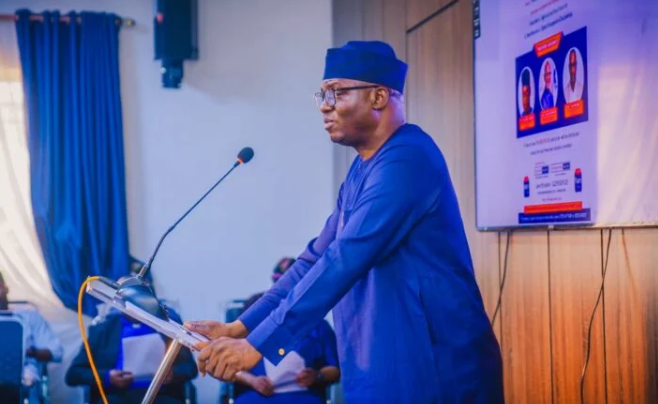Osun State Civil Service, as old as the state itself, was once a shining beacon among Nigeria’s state civil services. It was a legacy admired by many, especially during the tenure of Prince Olagunsoye Oyinlola. However, with the advent of Rauf Aregbesola’s administration, a new structure was introduced that contradicted the principles of an effective civil service, and this marked the onset of a decline that the Osun State Civil Service has yet to recover from. The issue worsened after the revered Elder Segun Akinwusi, a Modakeke-born administrative genius, departed from his role as Head of Service. No successor has since managed to unravel the complexity behind the weakening state of our primary institution. We cannot continue to stand idly by as the situation spirals beyond repair.
If we sincerely desire a functional and effective Civil Service under the next Head of Service, several critical issues must be addressed to restore the system’s attractiveness and functionality. As a concerned Osun indigene and columnist, I feel compelled to articulate the pressing demands of the technocrats and concerned citizens who seek to revive our beloved civil service.
*Key Issues Demanding Attention*
Rejuvenating Administrative Cadres
The morale in the Administrative Officers’ cadre is alarmingly low. The once-esteemed positions now suffer from neglect and a lack of opportunities for growth. The practice of keeping officers in the same roles for excessive periods stifles innovation and career development. A reshuffling strategy, as advocated by concerned technocrats, is essential to revitalizing this cadre. By rotating officers regularly, we can foster a culture of continuous learning and adaptability, crucial traits for a modern civil service.
Scrapping the Unified Public Service Policy
The policy of a Unified Public Service has not yielded the expected benefits. Instead, it has blurred the lines between different service sectors, leading to inefficiencies. The leftover Local Government Staff, who were incorporated into the mainstream civil service, should be returned to their original roles to restore clarity and order. This step will not only streamline operations but also ensure that each department functions optimally within its defined parameters.
Revisiting the Tutors-General & District Education Offices
While the concept of Tutors-General & District Education Offices might have been successful in Lagos for political reasons, it has not translated well to Osun. The unique challenges faced by our state require tailored solutions, not the wholesale adoption of external models. Scrapping this system in favor of a more contextually appropriate educational administration model will likely yield better results in terms of educational outcomes and resource management.
Promoting an Ethical Labour Movement
An ethical, responsive, and responsible labor movement is fundamental to the success of any civil service. The establishment of a labor movement with an open-door policy and accountability to workers is non-negotiable. Regular congresses where grievances can be aired and addressed will empower civil servants and ensure that their voices are heard. A labor movement that prioritizes transparency and worker welfare is essential for fostering trust and cooperation between the workforce and leadership.
*Annual Promotions and Career Development*
Promotions are a key motivator for any workforce. The practice of delaying promotions undermines morale and stifles career progression. The new Head of Service must ensure that promotions are conducted annually, restoring a sense of progression and reward for hard work. This will not only motivate existing staff but also attract new talent to the civil service, as opportunities for advancement are a significant draw for potential recruits.
Completing the Civil Service Commission Building
The completion of the Civil Service Commission building within the State Secretariat is long overdue. The proposed land, currently lying unused behind Wema Bank, adjacent to the Bureau of Local Government Pension Bureau at Abẹrẹ, should be developed as a matter of priority. This infrastructure is not just a physical asset but a symbol of commitment to the civil service’s future. A completed building will serve as a hub for administrative excellence and coordination.
Filling Vacant Positions
The presence of numerous vacant positions, especially in the Accounting Officers line, is a significant barrier to efficient service delivery. Prioritizing the filling of these vacancies, with particular attention to the Administrative Officers cadre, will ensure that the civil service operates at full capacity. This step is critical for maintaining operational continuity and effectiveness, as understaffed departments can significantly hinder overall performance.
*Accessible and Relational Leadership*
The next Head of Service must embody a leadership style that is both accessible and relational. By leading through example and maintaining open lines of communication with all levels of staff, the Head of Service can bridge the gap between past leaders and upcoming technocrats. This approach will foster a collaborative environment where ideas can be freely exchanged, and innovative solutions can be developed.
*Abolishing Service Extension Policies*
The policy of extending service for officers in any cadre should be abolished. Such extensions often serve personal interests rather than the public good and can impede the progression of younger, more dynamic officers. By adhering to established retirement norms, the civil service can rejuvenate its workforce and infuse it with fresh perspectives, ensuring that it remains agile and forward-thinking.
The Path Forward: A Hope for Renewal
As Osun State anticipates the appointment of a new Head of Service, it is crucial that political leaders are guided to make informed and strategic decisions. The civil service is the backbone of governance, and its health directly impacts the socio-economic and political wellbeing of our state. By addressing these pressing issues, we can pave the way for a revitalized civil service that meets the needs of our people and supports the administration’s goals.
In conclusion, while change is the only constant, the trajectory of that change depends on the actions we take today. The Osun State Civil Service, once a beacon of excellence, can rise again. It is up to us, as concerned indigenes and stakeholders, to advocate for the necessary reforms and hold our leaders accountable. Together, we can restore the civil service to its former glory and ensure that it serves the best interests of Osun State and its people.
Advertisement





